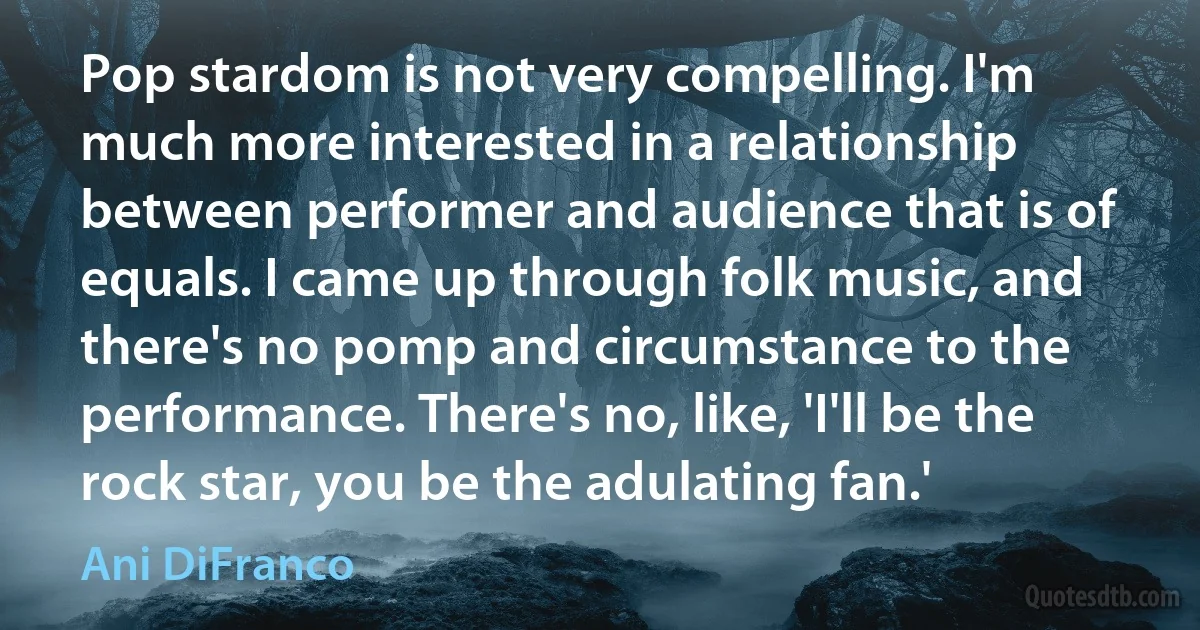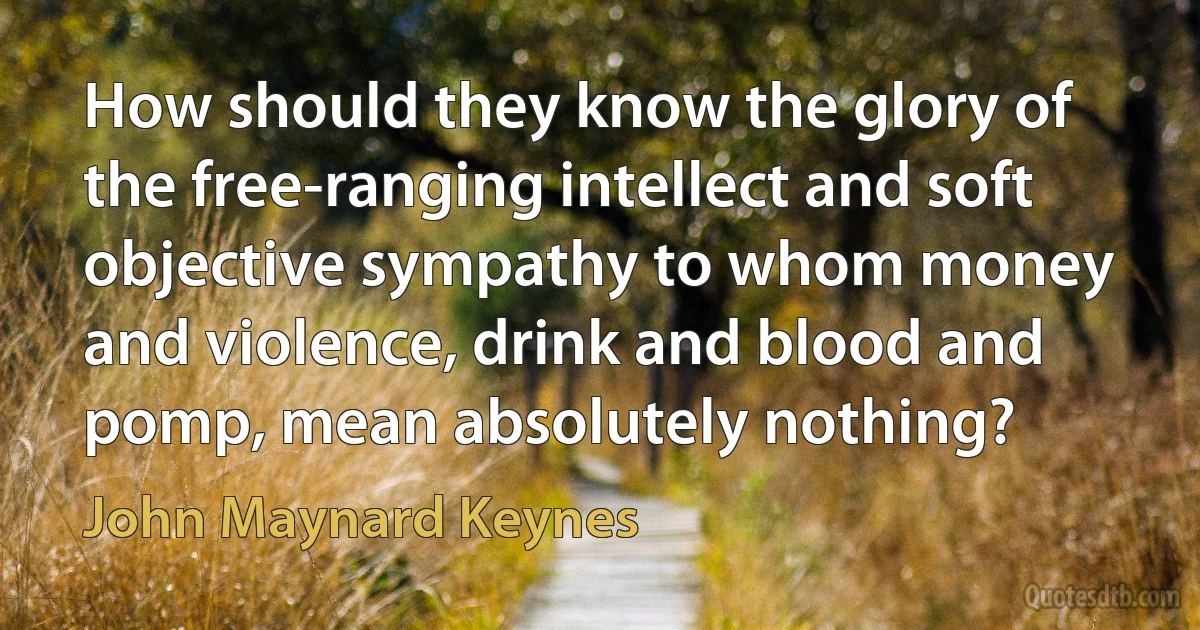Pomp Quotes - page 3
In the future, the eyes of humanity will be fixed upon the Christ, and not upon any such man-made institutions as the Church and its dignitaries; Christ will be seen as He is in reality, working through His disciples, through the Masters of the Wisdom, and through His followers who toil unseen (and usually unrecognised) behind world affairs. The sphere of His activity will be known to be the human heart and also the crowded market places of the world, but not some stone edifice, and not the pomp and ceremony of any ecclesiastical headquarters.

Alice Bailey
These are the hands whose sturdy labor brings The peasant's food, the golden pomp of kings This is the page whose letters shall be seen, Changed by the sun to words of living green This is the scholar whose immortal pen Spells the first lesson hunger taught to men These are the lines that heavencommanded Toil Shows on his deed, the charter of the soil.

Oliver Wendell Holmes Jr.
Therefore, to be possess'd with double pomp, To guard a title that was rich before, To gild refined gold, to paint the lily, To throw a perfume on the violet, To smooth the ice, or add another hue Unto the rainbow, or with taper-light To seek the beauteous eye of heaven to garnish, Is wasteful and ridiculous excess.

William Shakespeare
Beyond the grave! As the vision rises how this side dwindles into nothing - a speck - a moment - and its glory and pomp shrink into the trinkets and baubles that amuse an infant for a day. Only those things, in the glory of this light, which lay hold of immortality, seem to have any value.

Randolph Sinks Foster
In the character of the victim [Lincoln], and even in the accessories of his last moments, there is something so homely and innocent that it takes the question, as it were, out of all the pomp of history and the ceremonial of diplomacy-it touches the heart of nations and appeals to the domestic sentiment of mankind.

Benjamin Disraeli
After the March to Finchley, the next print I engraved, was the Roast Reef of old England; which took its rise from a visit I paid to France the preceding year. The first time an Englishman goes from Dover to Calais, he must be struck with the different face of things at so little a distance. A farcical pomp of war, pompous parade of religion, and much bustle with very little business. To sum up all, poverty, slavery, and innate insolence, covered with an affectation of politeness, give you even here a true picture of the manners of the whole nation... By the fat friar, who stops the lean cook that is sinking under the weight of a vast sirloin of beef, and two of the military bearing off a great kettle of soup maigre, I meant to display to my own countrymen the striking difference between the food, priests, soldiers, &c. of two nations so contiguous, that in a clear day one coast may be seen from the other.

William Hogarth
[...] the very function of the House of the People was [...] to make concrete the social inequality between the dictator's lowly vassals and the pomp and might of His Majesty. The architect of the House had been selected by a competition. There were a lot of interesting and arresting designs, but, to put it rather brusquely, the architect who came up with the most banal, Stalinist pastiche appealed successfully to the Ceausescu's taste. The prizewinner, after the revolution, has disappeared from view because she has been battered by much hostile criticism.

John Sweeney (journalist)
I would I were a careless child,
Still dwelling in my Highland cave,
Or roaming through the dusky wild,
Or bounding o'er the dark blue wave;
The cumbrous pomp of Saxon pride,
Accords not with the freeborn soul,
Which loves the mountain's craggy side,
And seeks the rocks where billows roll.
Fortune! take back these cultur'd lands,
Take back this name of splendid sound!
I hate the touch of servile hands,
I hate the slaves that cringe around:
Place me among the rocks I love,
Which sound to Ocean's wildest roar;
I ask but this-again to rove
Through scenes my youth hath known before.
Fain would I fly the haunts of men-
I seek to shun, not hate mankind;
My breast requires the sullen glen,
Whose gloom may suit a darken'd mind.

Lord Byron
Therefore, to be possess'd with double pomp,
To guard a title that was rich before,
To gild refined gold, to paint the lily,
To throw a perfume on the violet,
To smooth the ice, or add another hue
Unto the rainbow, or with taper-light
To seek the beauteous eye of heaven to garnish,
Is wasteful, and ridiculous excess.

King John
Born and bred a member of the leather-aproned class, Franklin was, at least for most of his life, more comfortable with artisans and thinkers than with the established elite, and he was allergic to the pomp and perks of a hereditary aristocracy. Throughout his life he would refer to himself as "B. Franklin, printer."
From these attitudes spring what may be Franklin's most important vision: an American national identity based on the virtues and values of its middle class. Instinctively more comfortable with democracy than were his fellow founders, and devoid of the snobbery that later critics would feel toward his own shopkeeping values, he had faith in the wisdom of the common man and felt that a new nation would draw its strength from what he called "the middling people." Through his self-improvement tips for cultivating personal virtues and his civic-improvement schemes for furthering the common good, he helped to create, and to celebrate, a new ruling class of ordinary citizens.

Walter Isaacson
KING JOHN. Here once again we sit, once again crown'd,
And look'd upon, I hope, with cheerful eyes.
PEMBROKE. This once again, but that your Highness pleas'd,
Was once superfluous: you were crown'd before,
And that high royalty was ne'er pluck'd off,
The faiths of men ne'er stained with revolt;
Fresh expectation troubled not the land
With any long'd-for change or better state.
SALISBURY. Therefore, to be possess'd with double pomp,
To guard a title that was rich before,
To gild refined gold, to paint the lily,
To throw a perfume on the violet,
To smooth the ice, or add another hue
Unto the rainbow, or with taper-light
To seek the beauteous eye of heaven to garnish,
Is wasteful and ridiculous excess.

William Shakespeare
The ancient Indians distrusted the pace and pomp of urbandom; they distrusted it strongly enough to resist central authority and conformism....
"To know my country one has to travel to that age, when she realized her soul and thus transcended her physical boundaries when she revealed her being in a radiant magnanimity which illumined the eastern horizon, making her recognized as their own by those in alien shores who were awakened into a surprise of life."...
[He also said about the culture of Indonesia:] ' I see India all around me.'

Rabindranath Tagore


